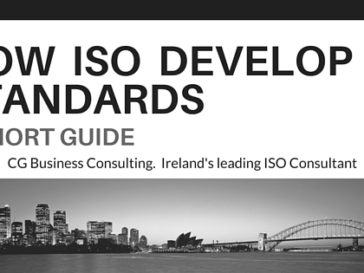CGBC Celebrates International Women’s Day 2022
CGBC Celebrates International Women’s Day 8 March 2022 Did you know International Women’s Day took place for the first time in 1911, since then we...
4 min read
Caroline Geoghegan : Mar 30, 2022 2:54:02 PM

In this blog, we are going to discuss "How Sustainability Became the Key to Competitive Strategy?"
Cost savings, increased market share, and access to public contracts are just some of the key drivers behind the shift towards sustainability.
Thanks to stalwarts of conservation and environmental protection such as David Attenborough and Chris Packham and their ground-breaking TV documentaries, global awareness of climate change and sustainability has grown exponentially over the past decade. Most recently, the emergence of child-campaigner Greta Thunberg has led to a younger and louder voice for green and clean change. A new generation leading climate crisis rallies in cities across the globe from Oslo to Caracas.
Unsurprisingly, the increased significance of sustainability has not been lost on business leaders and analysts, with businesses across all industries now following the green zeitgeist. With this drive towards a more sustainable future, the acronym ESG has become a top-of-the-list fixture on the agendas of C-level board meetings and new year business planning sessions.
ESG is a set of non-financial measures that contributes directly to an organisation’s risk management profile, sustainability development, and corporate social responsibility. It refers to the three main subject areas of sustainable development for measuring the risks and opportunities in business performance.
Fail to prepare, prepare to fail.
ESG, or Environment, Social, and Governance to give it its full title, are hot topics in modern business. Corporate responsibility, carbon footprint, and transparency have become buzzwords of our time. With governments at both local and national levels tightening environmental, fiscal, and corporate legislation and regulations, it makes good business sense to incorporate ESG into corporate strategy.
This was the question at the heart of a recent report published recently by the ECODA - European Confederation of Director’s Associations (in conjunction with Mazars). Instead of treating sustainability as a politically correct add-on to corporate policy, the report recommends business leaders pay attention to the benefits that can be reaped by prioritising sustainability when developing strategy.
More and more, B2B customers expect supply chains to be sustainable while retail customers are demanding eco-friendly alternatives. In addition, employees expect employers to provide them with safe, healthy, and environmentally conscious workplaces.
‘In an employee’s markets, senior managers are only too aware that employees want to work for responsible businesses.’
At a time when educational, social, and mental health issues are in the spotlight, and both homelessness and poverty are reaching crisis levels, stakeholders from employees to customers expect organisations to pro-actively engage in and promote corporate social responsibility initiatives, particularly within their local communities.
In an employee’s markets, senior managers are only too aware that more and more prospective employees want to work only for responsible businesses. And that doesn’t just mean eco-friendly, socially aware organisations. It also runs to businesses adopting tight corporate governance, operational transparency, and working within the boundaries of national and international legislation and regulations.
Customers and employees alike want to align with organisations that have robust ESG policies. In the business world of 2022, sustainability has a direct impact on staff recruitment, retention, and work rate. It also positively impacts revenue, costs, and market share.
Running a business responsibly, being climate-aware, and moving towards net-zero will reduce cost, increase margins and help broaden customer reach.
The environmental perspective includes anything that contributes to carbon emissions and climate change, such as energy, water, and waste management, ventilation/air quality, materials sourcing and management, and supply chain management.
The social perspective addresses the relationships and reputation a company has with its stakeholders, such as employee engagement, diversity and inclusion, health and safety, human rights and community relations, and labour practices.
The governance perspective is the internal system of practices, controls, and procedures that a company uses to govern/manage itself, such as business model resilience, risk management, legal and regulatory compliance, due diligence, and meeting external stakeholders’ needs.
ISO Standards can help shore up even the most ambitious of ESG strategies. Through its extensive network of resilient and business bolstering standards, ISO can help those organisations wishing to get one step ahead of legislative, regulatory, and social change.
The first step for companies on the road to sustainability is to understand their fundamental business needs in terms of maintenance, growth, and continuous improvement. Where energy costs are of paramount importance to IT Hosting companies, managing hazardous chemicals is vital to the Pharma industry. So, these areas are where their initial focus must lie.
There are several factors fundamental to building a sustainable business. These include,
An organisation’s ESG strategy can be augmented and advanced through ISO Certification and the implementation of individual or integrated management systems. For example, a sustainable business process framework might include:
| ISO 9001 | Leadership, Customer and Quality focused, Corporate Governance |
|---|---|
| ISO 26001 | Social Responsibility Guide |
| ISO 27001 | IT/Data Security & Governance |
| ISO 14001 | Environmental Management, with a focus on Waste, Water & Air |
| ISO 14067 | Carbon Footprint reduction & Net Zero |
| ISO 37001 | Anti-Corruption, Transparency (Fraud Prevention, Money Laundering Risk Assessment, etc.) |
| ISO 45001 | Robust Framework for Occupational Health & Safety |
| ISO 50001 | Energy Conservation and Efficiency |
In terms of ESG, these ISO Standards underpin its three pillars as follows:
| ENVIRONMENTAL | SOCIAL | GOVERNANCE |
|---|---|---|
| ISO 14001 | ISO 26001 | ISO 9001 |
| ISO 14067 | ISO 27001 | ISO 27001 |
| ISO 50001 | ISO 45001 | ISO 37001 |
By bringing ISO into the conversation around ESG, business leaders can better plan their journey to a more sustainable and competitive future. In building that future on a robust framework of ISO Standards, organisations can clearly identify corrective actions, potential risks, and possible opportunities.
And in a stark reminder that we are moving rapidly into a global social business network, ESG planning must avoid being inward-facing. Under Greenhouse Gas Protocols, all businesses will have the responsibility not just for their emissions but also for those Scope 3 emissions existent within their supply or value chain. Put simply, “suppliers’ manufacturing operations emissions will be included in their customers’ carbon footprints.”
In essence, organisations need to become more collaborative in their efforts to reduce their carbon footprint, achieve Net Zero and become wholly sustainable.
This collaborative effort cannot be achieved through strategy alone. Strong policies require robust processes, impermeable risk frameworks, and operational streamlining and coordination, all of which can be seamlessly achieved through the adoption of and certification to ISO Standards such as ISO 9001, ISO 14001, and ISO 27001.
Sustainability, achievable through strong EGS policies underpinned by a robust ISO framework, will, without doubt, be your company’s key competitive differentiator.
*Note - The ECODA report also includes a tool to help organisations self-assess their effectiveness in reaching long-term sustainability - see https://ecoda.eu for more details.

CGBC Celebrates International Women’s Day 8 March 2022 Did you know International Women’s Day took place for the first time in 1911, since then we...

Celebrate Environmental Sustainability with us today on World MSME Day. How are MSME's making it Big in the Sustainable Movement.

The International Standards Organisation explains how they develop a new ISO standard An ISO standard is developed by a panel of experts, within a ...